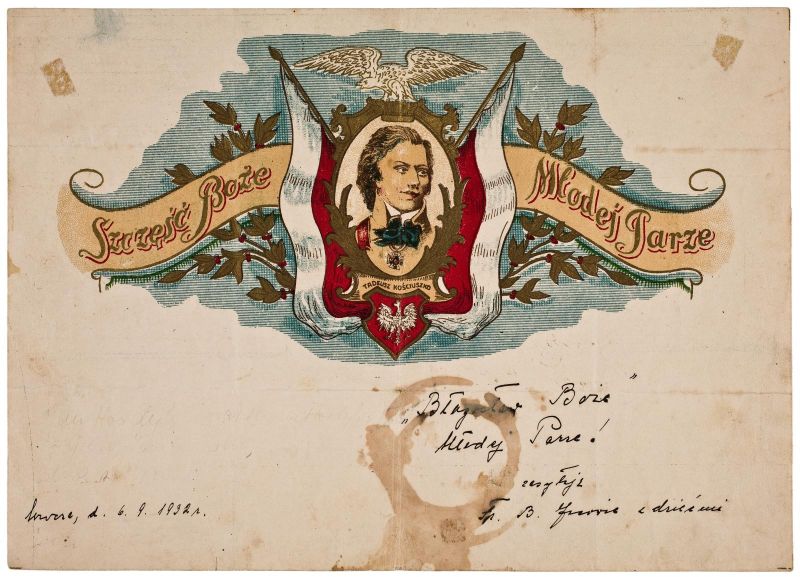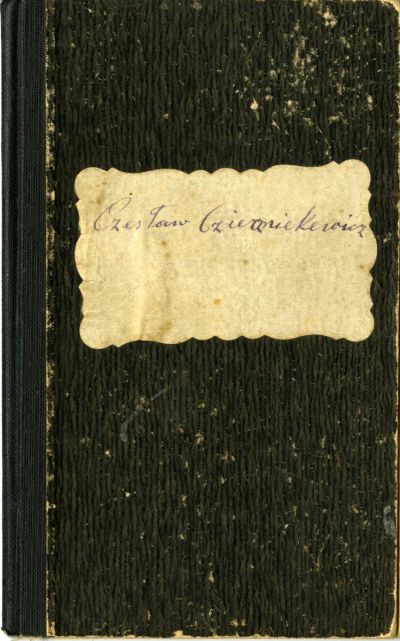“Faithful to the Fatherland, even in foreign lands”. Patriotic telegrams from the Polish diaspora in Wrocław
Mediathek Sorted












The Gabinet Dokumentów Muzeum Narodowego we Wrocławiu (Document Gallery of Wrocław National Museum) has a bundle of twelve “Kościuszko telegrams” ranging from 1913 to 1932 that represent interesting but at the same time fleeting testimonies of community life at this time. They are all linked to the work of Polish organisations in Wrocław before 1939. Their recipients and senders were national activists, people who thought and felt in Polish when in foreign lands.
Four of these telegrams relate to the Stache family, five to the Hordyk family.
The two oldest telegrams contain messages of congratulations for Franciszka and Jan Stache on the occasion of their wedding in Lubawa on 22 July 1913 in Pomerania. What do we know about the recipients?
Franciszka, née Kaślewska, came from Lubawa and took her first holy communion there on 20 September 1903.[13] Ten years later, she married Jan Stache, whose family hailed from Silesia. Jan and Franciszka settled in Wrocław where they were involved in the culture and education of the local Polish community. As an organist, Jan Stache headed up the choir in St Martins church, where the Polish diaspora in Wrocław used to gather. He was also a member of the Towarzystwo Śpiewu “Harmonia” (“Harmony” singing group). After Poland regained its independence , he worked in the Consulate of the Republic of Poland in Wrocław from 1925 to 1927. He died in 1931.[14] His wife Franciszka, who was also involved in the Polish organisations in Wrocław, was arrested on 2 September 1939 directly after war broke out, and deported to the Ravensbrück concentration camp where she remained imprisoned until June 1940.[15] The letter that she wrote to her daughter Helena Stache in Wrocław whilst in the camp is from this time.[16] Fortunately, Franciszka Stache survived the war and lived for several years in Polish Wrocław.
The first wedding telegram for Franciszka and Jan Stache shows a seemingly patriotic landscape with figures and symbols in front of an architectural folly. Two men in national costume hold a cartouche with a white eagle in their hands under which a stone tablet bearing the years of the divisions and the uprisings can be seen. Views of a town and of a village can be seen in the background. The heading bears the words “Na cele narodowe!” (for charitable causes) and below “Świadomość ludu – dokona cudu!” (The people’s consciousness creates miracles). The composition is completed by two poles bearing red and white banners on which the slogans “Oświata” (Education) and “Pilność” (Industry) can be seen on the left and “Praca” (Work) and “Trzeźwość” (Prudence) on the right. The free field below contains the words of congratulations “Sto lat, sto lat beczkę wina, najpierw córkę potem syna” (a hundred years, a hundred years, a barrel full of wine, first a daughter, then a son) which was signed by “Jabłoński and wife”. These wishes, bestowed upon the happy couple by the Jabłońskis upon their marriage, soon came to fruition: In 1914 the Stache’s first child, their daughter Helena, was born and a few years later in 1920, their son Józef.[17]
The second wedding telegram shows an arch on two columns in the middle of which an angel is depicted with the coats of arms of Poland, Lithuania and Ruthenia. The archivolt bears the inscription “Cel narodowy i dobroczynny” (For non-profit, charitable causes).
Two more telegrams delivered congratulations on the occasion of Jan Stache's name day. One is from 1928, the second is from 1930. The first telegram is decorated with an oval cartouche held by two Cupids in which the portrait of Count Józef Poniatowski is inlaid. An eagle with a crown can be seen at the top edge of the cartouche. Under this is the Polish national coat of arms on a red background. The composition is finished off by two sashes (left and right) on which the first line of the “Rota” song can be read: “Nie rzucim ziemi skąd nasz ród” (We will not give up our Fatherland). The messages of congratulations were signed by the representatives of the following Wrocław organisations Towarzystwo Szkolne Polskie (Polish School Association), Kółko Śpiewackie “Harmonia” (Singing group “Harmonie”), Biblioteka Ludowa (Public Library) and Związek Polaków w Niemczech Oddział Wrocław (Union of Poles in Germany, Wrocław Branch).
[13] The memento of the first holy communion for Franciszka Kaślewska (married name Stache) from 20 September 1903 can be found in the Gabinet Dokumentów Muzeum Narodowego we Wrocławiu (referred to below as GD MNWr.), Inv. No. XX – 797.
[14] Do nich przyszła Polska… Wspomnienia Polaków mieszkających we Wrocławiu od końca XIX w. do 1939 r., selected and edited by A. Zawisza, Wrocław 1993, p. 313.
[15] Ibid, p. 315.
[16] Can be found in GD MNWr., Inv. No. XX-795.
[17] The memoirs of Józef Stache, typescript [ca.1969] can be found in the GD MNWr.
























































































